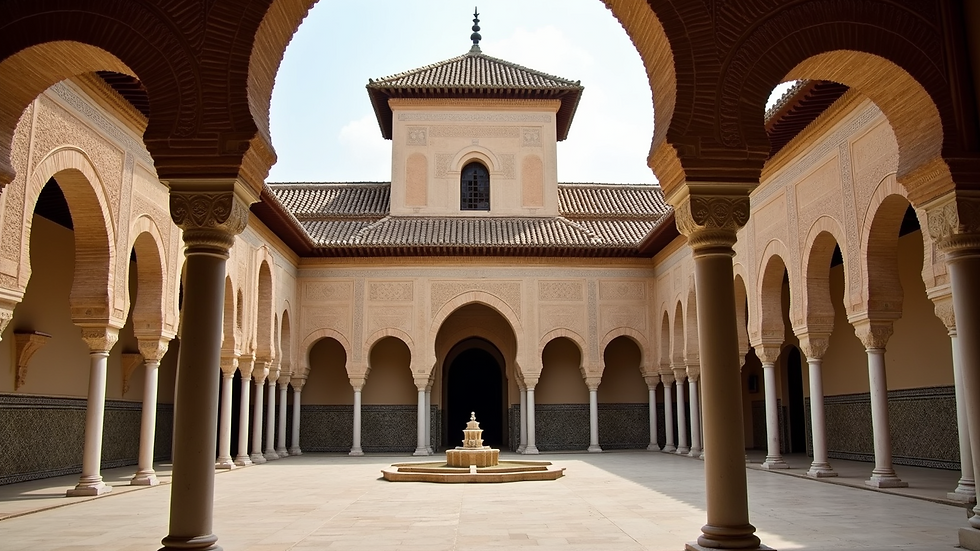The Moors: Builders of Legacy in Spain and the Royal Mindset You Inherit
- Marvisha Singletary

- Aug 10
- 4 min read
The history of Spain is vibrant and layered, filled with the contributions of various cultures. Among these, the Moors played a pivotal role, shaping the Iberian Peninsula for more than 700 years. Their impact wasn't limited to governance; they brought significant advancements in education, medicine, and architecture that continue to resonate throughout Spanish culture. This post delves into the remarkable legacy of the Moors and how their achievements can inspire a modern royal mindset in us today.

The Moorish Influence in Spain
The Moors, predominantly Muslim peoples from North Africa, invaded the Iberian Peninsula in 711 AD and maintained their rule until 1492. During this period, they transformed Spain into a vibrant center of learning and culture. The Moors introduced a wealth of knowledge in fields like mathematics, astronomy, and medicine.
Their educational contributions were groundbreaking. For instance, they established universities, such as the prestigious University of Toledo, which created a multilingual environment where scholars translated texts. This process of translation helped preserve and disseminate ancient knowledge, making it accessible to a broader audience.
In medicine, the Moors revolutionized practices by introducing advanced surgical techniques. They used herbal remedies and combined treatments derived from both classical Greek and Arabic traditions. Significantly, in 1010 AD, the physician Abu Ali al-Husayn ibn Abdallah ibn Sina (known as Avicenna) compiled "The Canon of Medicine," which became a standard reference in Europe for centuries, influencing medical teaching until the 17th century.
The architectural legacy of the Moors is undeniably impressive. Stunning structures like the Alhambra in Granada and the Great Mosque of Córdoba exemplify their artistic and engineering skills. The intricate designs, adorned with geometric patterns and lush gardens, reflect a blend of function and beauty that continues to inspire architects worldwide. The Alhambra, for example, is a UNESCO World Heritage site and attracts over 2 million visitors each year, illustrating its enduring appeal.

The Mindset of Builders
Reflecting on the achievements of the Moors reveals the mindset that fueled their innovations. They were builders, not beggars. This attitude is vital for anyone who wishes to make a significant impact in their lives and communities.
Embracing the idea that you come from builders opens your eyes to the endless possibilities around you. With this perspective, you grasp that you hold the power to create, innovate, and contribute meaningfully to society. Having a resilient mindset undeterred by challenges is essential for reaching your goals.
The Moors embodied this builder mentality. They transformed a fragmented land into a thriving civilization. Rather than waiting for opportunities, they actively shaped their environment, setting a legacy that would extend far beyond their time.
Walking Like Royalty
In our daily lives, we can draw motivation from the Moors by adopting a royal mindset. This involves walking with confidence, embracing our history, and acknowledging our power to instigate change.
Walking like royalty means carrying yourself with dignity and purpose. It is about recognizing your worth and the significance of your contributions. When you embody this mindset, you uplift not only yourself but also inspire those around you to embrace their potential.
Challenge yourself to live with this royal attitude today. Stand tall, articulate your ideas with conviction, and approach your tasks with a builder's determination. Whether you are striving for personal achievements or contributing to community initiatives, remember, you possess the power to create lasting change.
The Legacy of the Moors Today
The legacy of the Moors is not just a moment in history; it serves as a powerful example of innovation and cultural exchange. Their contributions to education, medicine, and architecture continue to shape modern society.
In Spain, elements of Moorish architectural style can be spotted in structures around the country. Additionally, the healthcare frameworks and hygiene principles they established remain at the core of contemporary medical practices. For instance, the emphasis they placed on sanitation led to the establishment of hospitals with clean facilities, a practice that is foundational in modern medicine.
Furthermore, the spirit of the Moors lives on in Spain's rich cultural mosaic. Their influences are evident in the Spanish language, where numerous words of Arabic origin exist, such as "azúcar" (sugar) and "naranja" (orange). The culinary traditions, such as the famous paella, reflect a blend of diverse influences, making Spain's food scene truly vibrant.
As we navigate our own journeys, let us take to heart the lessons of the Moors. Embrace the builder mindset, walk confidently, and aspire to leave a legacy that reflects your values and dreams.
Embracing Our Inner Builders
The Moors ruled Spain for over 700 years, leaving behind a legacy that continues to inspire us today. Their significant contributions to education, medicine, and architecture exemplify the power of innovation and cultural exchange.
By adopting a royal mindset and recognizing our origins as builders, we empower ourselves to effect meaningful change in our lives and communities. Stand tall today—no shrinking. Honor your heritage, hold your head high, and remember that you have the potential to create your own legacy.
In the spirit of the Moors, let us strive to be architects of our destinies, crafting a brighter future for ourselves and the generations that follow.





Comments